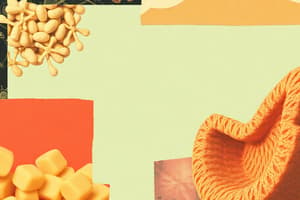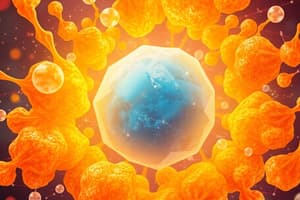Podcast
Questions and Answers
Which of the following is NOT a type of monosaccharide?
Which of the following is NOT a type of monosaccharide?
- Lactose (correct)
- Fructose
- Galactose
- Glucose
Which of the following enzymes is responsible for breaking down lactose into monosaccharides?
Which of the following enzymes is responsible for breaking down lactose into monosaccharides?
- Sucrase
- Lactase (correct)
- Amylase
- Maltase
What process is responsible for converting excess glucose into glycogen?
What process is responsible for converting excess glucose into glycogen?
- Glycolysis
- Glycogenolysis
- Glycogenesis (correct)
- Gluconeogenesis
What is the primary role of insulin in blood glucose regulation?
What is the primary role of insulin in blood glucose regulation?
Which of the following is NOT a polysaccharide?
Which of the following is NOT a polysaccharide?
What is a key factor to consider when choosing a carbohydrate source?
What is a key factor to consider when choosing a carbohydrate source?
What is the main limitation of the glycemic index?
What is the main limitation of the glycemic index?
Which of the following foods tend to have a lower glycemic index?
Which of the following foods tend to have a lower glycemic index?
What happens to fructose when it is ingested?
What happens to fructose when it is ingested?
What is a result of high fructose intake on the gut microbiome?
What is a result of high fructose intake on the gut microbiome?
What is a limitation of the fructose animal studies?
What is a limitation of the fructose animal studies?
What is the 'fructose survival hypothesis'?
What is the 'fructose survival hypothesis'?
Flashcards are hidden until you start studying
Study Notes
Classification of Carbohydrates
- Monosaccharides: single sugar molecules, including glucose, fructose, and galactose
- Disaccharides: sucrose (glucose + fructose), lactose (glucose + galactose), and maltose (2 glucose)
- Oligosaccharides: raffinose and stachyose
- Polysaccharides: starch (plant-based), glycogen (stored energy in muscles and liver), and cellulose (plant-based)
Carbohydrate Digestion and Absorption
- Amylase in saliva breaks down carbohydrates
- Lactase, maltase, and sucrase break down their respective disaccharides into monosaccharides
- Carbohydrates are broken down into monosaccharides before being absorbed into the bloodstream
Metabolism of Carbohydrates
- Excess glucose is converted to glycogen via glycogenesis, which requires energy and occurs in the liver or muscles
- When energy is needed, glycogen is broken down into glucose via glycogenolysis, producing lots of ATP
Blood Glucose Regulation
- High blood sugar promotes insulin to stimulate glucose uptake
- Low blood sugar promotes glucagon to stimulate glycogen breakdown to form glucose for energy
Choosing a Carbohydrate Source
- Nutrient density: the amount of nutrients per amount of food
- Glycemic index: measures how quickly a food raises blood sugar levels
- Glycemic load: takes into account the amount of carbohydrates consumed
- Fructose content: high fructose intake is associated with negative effects
- Fibre content: foods high in fibre are lower in GI and reduce the risk of negative effects
Glycemic Index Studies
- Low and high GI foods have similar outcomes when caloric intake is controlled
- Fibre is a significant confounder
- Baseline characteristics and variability in findings affect outcomes
- GI studies have limitations, including assessment on an empty stomach and variability in preparation and lifestyle
Fructose Metabolism
- Fructose has a different metabolic fate than glucose
- Fructose goes straight to the liver to be transformed to glucose via fructolysis
- Fructose has no negative feedback loop and can deplete energy stores
- Fructose is associated with increased blood pressure, type 2 diabetes, and obesity
Fructose Animal Studies
- High fructose intake leads to increased body weight, food intake, blood glucose, and decreased insulin
- Fructose intake is associated with increased uric acid and triglycerides
Fructose Survival Hypothesis
- Fructose turns on a survival switch to prepare for periods of starvation
- Increased fructose intake leads to increased blood pressure, eating, fat storage, insulin resistance, and low-grade inflammation
Fructose Human Studies
- High fructose intake increases visceral adiposity and leads to weight gain
- Fructose intake is associated with negative health effects, including increased blood pressure, type 2 diabetes, and obesity
Studying That Suits You
Use AI to generate personalized quizzes and flashcards to suit your learning preferences.




